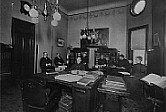Specifically, the emergence of medical specialization had a profound impact on CSH. For the first time, CSH enlisted the help of medical specialists, including a gynecologist, a dentist, a pathologist, and several physicians who had specialized in the "diseases of the mind".
CSH first hired a female gynecologist. In 1883, Superintendent William Fletcher, a caring and progressive physician, recommended that CSH employ a "lady" practitioner who was well-versed in "female ailments and afflictions":
"...it would be a comfort to every parent, brother, sister, to know that their afflicted loved ones who were insane from the fact of being a woman, were to fall into the hands of a cultured and refined female physician."
To support his case, Fletcher touted a well-regarded, nineteenth-century hypothesis that suggested that insanity in women was caused by ailments peculiar to the female reproductive system. In hindsight, such theories appear sexist. Yet, it was the very notion that women were biologically different and therefore, socially different than men, that compelled Fletcher to actively promote "woman's" physicians.
Theories of women's and men's social and biological uniqueness underscored separate sphere ideology which, ironically, was exploited by women professionals and male sympathizers, like Fletcher, to introduce women into professions previously closed to them. For Dr. Fletcher, as well as many other Victorians, women physicians were the best qualified to treat female patients with reproductive problems because Victorian women, who were modest, scrupulous and moral beings, should not be corrupted by male physicians performing pelvic examinations. Victorian sensibilities and a compulsion to protect the separation of the sexes drove women right into men's shoes.
In December 1883, Dr. Fletcher got his wish: Sarah Stockton, a graduate of the Women's Medical College of Philadelphia and a native of Tippecanoe County, joined the CHS staff. Dr. Fletcher was so pleased with her work -- "Dr. Sarah Stockton has continued her duties with perfect satisfaction and good results" -- that he featured her report of the "special work in the Department of Women" in the hospital's 1885 annual report to the board of trustees.
In a period when few female physicians were permitted to perform intrusive procedures in male-dominated hospitals, Dr. Fletcher encouraged Dr. Stockton to operate on female patients when necessary. While Fletcher may have hired Dr. Stockton based on his own preconceived ideas about the female sex, he gave Sarah the opportunity to shine in a man's world. By hiring Dr. Stockton, Fletcher also made it legitimate for other superintendents to hire female physicians for the women's department, which they continued to do until 1927.

Sarah Stockton with Male Colleagues, CSH Pathology Departmental Library, 1910 (57.2 kb)
Soon after Dr. Stockton began her tenure at CSH, pathologist E.F. Hodges joined the staff in 1885. The hiring of Dr. Hodges set a series of events in motion that transformed CSH from a custodial facility into a treatment and research center. For the first time, CSH medical superintendents began to take a new interest in the systematic study of the physical causes of mental illness.
